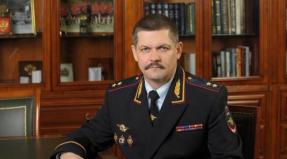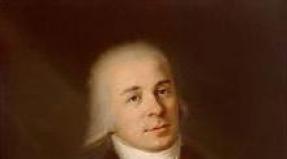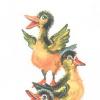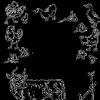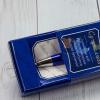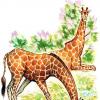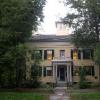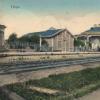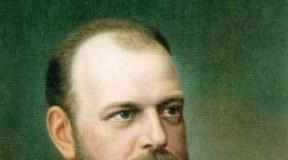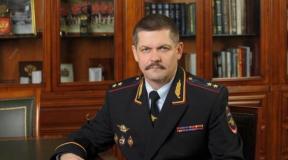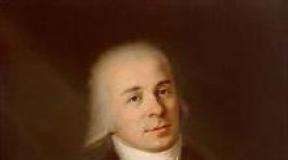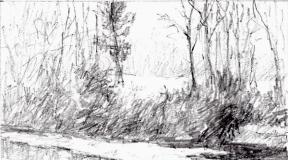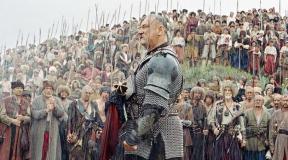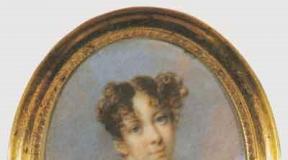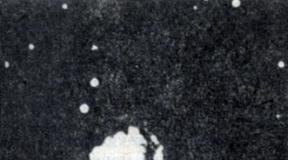Railway. Railway (Nikolai Nekrasov) There is no ugliness in nature
Vania
(in the coachman's jacket)
Dad! who built this road?
Dad
(In a coat with a red lining)
Count Pyotr Andreevich Kleinmichel, my dear!
(conversation in the carriage)
Glorious autumn! Healthy, vigorous
The air invigorates tired forces;
Fragile ice on the icy river
It lies like melting sugar;
Near the forest, like in a soft bed,
You can get a good night's sleep - peace and space!
The leaves have not yet had time to fade,
Yellow and fresh, they lie like a carpet.
Glorious autumn! Frosty nights
Clear, quiet days...
There is no ugliness in nature! And kochi,
And moss swamps and stumps -
Everything is fine under the moonlight,
Everywhere I recognize my native Rus'...
I fly quickly on cast iron rails,
I think my thoughts...
Good dad! Why the charm?
Should I keep Vanya the smart one?
You will allow me in the moonlight
Show him the truth.
This work, Vanya, was terribly enormous -
Not enough for one!
There is a king in the world: this king is merciless,
Hunger is its name.
He leads armies; at sea by ships
Rules; rounds up people in an artel,
Walks behind the plow, stands behind
Stonemasons, weavers.
It was he who drove the masses of people here.
Many are in a terrible struggle,
In life, calling upon these barren wilds,
They found a coffin for themselves here.
The path is straight: the embankments are narrow,
Columns, rails, bridges.
And on the sides there are all Russian bones...
How many of them! Vanechka, do you know?
Chu, there were menacing exclamations!
Stomping and gnashing of teeth;
A shadow ran across the frosty glass...
What's there? Crowd of the dead!
Then they overtake the cast-iron road,
They run in different directions.
Do you hear singing?..."On this moonlit night,
We love to see our work!
We struggled under the heat, under the cold,
With an ever-bent back,
They lived in dugouts, fought hunger,
They were cold and wet, and suffered from scurvy.
The literate foremen robbed us,
The authorities flogged me, the need was pressing...
We, God's warriors, have endured everything,
Peaceful children of labor!
Brothers! you are reaping our fruits!
We are destined to rot in the earth...
Do you still remember us poor people kindly?
Or have you forgotten a long time ago?..”
Do not be horrified by their wild singing!
From Volkhov, from Mother Volga, from Oka,
From different ends of the great state -
This is all! your brothers are men!
It's a shame to be timid, to cover yourself with a glove,
You're not little!.. With Russian hair,
You see, he’s standing there, exhausted by fever,
Tall, sick Belarusian:
Bloodless lips, drooping eyelids,
Ulcers on skinny arms
Always standing in knee-deep water
The legs are swollen; tangles in hair;
I'm digging into my chest, which I diligently put on the spade
Day after day I worked hard all my life...
Take a closer look at him, Vanya:
Man earned his bread with difficulty!
I didn’t straighten my hunchbacked back
He is still: stupidly silent
And mechanically with a rusty shovel
It's hammering the frozen ground!
This noble habit of work
It would be a good idea for us to adopt...
Bless the work of the people
And learn to respect a man.
Don’t be shy for your dear fatherland...
The Russian people have endured enough
Took this railroad out -
He will endure whatever God sends!
Will bear everything - and a wide, clear
He will pave the way for himself with his chest.
It’s just a pity to live in this wonderful time
You won't have to - neither me nor you.
At this moment the whistle is deafening
He squealed - the crowd of dead people disappeared!
“I saw, dad, I had an amazing dream,”
Vanya said, “five thousand men,”
Representatives of Russian tribes and breeds
Suddenly they appeared - and he said to me:
“Here they are - the builders of our road!..”
The general laughed!
"I was recently within the walls of the Vatican,
I wandered around the Colosseum for two nights,
I saw St. Stephen in Vienna,
Well... did the people create all this?
Excuse me for this impudent laugh,
Your logic is a little wild.
Or for you Apollo Belvedere
Worse than a stove pot?
Here are your people - these thermal baths and baths,
It’s a miracle of art - he took everything away!”
- “I’m not speaking for you, but for Vanya...”
But the general did not allow him to object:
"Your Slav, Anglo-Saxon and German
Do not create - destroy the master,
Barbarians! wild bunch of drunkards!..
However, it’s time to take care of Vanyusha;
You know, the spectacle of death, sadness
It is a sin to disturb a child's heart.
Would you show the child now?
The bright side..."
- "I'm glad to show you!
Listen, my dear: fatal works
It’s over - the German is already laying the rails.
The dead are buried in the ground; sick
Hidden in dugouts; working people
A tight crowd gathered around the office...
They scratched their heads:
Every contractor must stay,
Walking days have become a penny!
The foremen entered everything into a book -
Did he take you to the bathhouse, or was he lying sick?
"Maybe there is a surplus here now,
Here you go!..” - they waved their hand...
In a blue caftan - a venerable meadowsweet,
Thick, squat, red as copper,
A contractor is traveling along the line on holiday,
He goes to see his work.
The idle people part decorously...
The merchant wipes the sweat from his face
And he says, putting his hands on his hips:
“Okay... nothing... well done!.. well done!..
With God, now go home - congratulations!
(Hats off - if I say!)
I expose a barrel of wine to the workers
And - I give the arrears..."
Someone shouted “hurray”, They picked it up
Louder, friendlier, longer... Lo and behold:
The foremen rolled the barrel singing...
Even the lazy man could not resist!
The people unharnessed the horses - and the purchase price
Shouting “hurray” he rushed along the road...
It seems difficult to see a more gratifying picture
Shall I draw, general?..
Vanya (in the coachman’s Armenian jacket). Dad! who built this road? Dad (in a coat with a red lining), Count Pyotr Andreevich Kleinmichel, darling! Conversation in the carriage 1 Glorious autumn! Healthy, vigorous Air invigorates tired forces; The fragile ice lies on the icy river, like melting sugar; Near the forest, as if in a soft bed, you can sleep - peace and space! The leaves have not yet had time to fade; they lie yellow and fresh, like a carpet. Glorious autumn! Frosty nights, Clear, quiet days... There is no ugliness in nature! And kochi, And moss swamps, and stumps - Everything is fine under the moonlight, I recognize my native Rus' everywhere... I fly quickly on cast-iron rails, I think my thoughts... 2 Good dad! Why keep Smart Vanya in his charm? Let me show him the truth in the moonlight. This work, Vanya, was terribly enormous and beyond the capabilities of one person! There is a king in the world: this king is merciless, Hunger is his name. He leads armies; Rules ships at sea; gathers people into the artel, walks behind the plow, stands behind the shoulders of stonemasons and weavers. It was he who drove the masses of people here. Many - in a terrible struggle, calling these barren wilds to life, found a coffin here for themselves. The road is straight: narrow embankments, posts, rails, bridges. And on the sides there are all Russian bones... So many of them! Vanechka, do you know? Chu! menacing exclamations were heard! Stomping and gnashing of teeth; A shadow ran across the frosty glass... What's there? Crowd of the dead! Either they overtake the cast-iron road, or they run sideways. Do you hear the singing?.. “On this moonlit night, We love to see our work! We toiled under the heat, under the cold, With our backs always bent, We lived in dugouts, struggled with hunger, We were cold and wet, we suffered from scurvy. We were robbed by literate foremen. , The authorities flogged us, we were pressed by need... We, God’s warriors, have endured everything, Peaceful children of labor! You are reaping our fruits! "Do not be horrified by their wild singing! From Volkhov, from mother Volga, from Oka, from different ends of the great state - These are all your brothers - men! It’s a shame to be timid, to cover yourself with a glove, You’re no longer small! tangles in hair; I'm digging into my chest, which I've been diligently leaning on the spade all my life, day after day... Look at him, Vanya, carefully: It was hard for the man to earn his bread! He hasn’t straightened his hunchbacked back even now: he’s stupidly silent And with a mechanical rusty shovel he’s hammering away at the frozen ground! It wouldn’t be a bad thing for us to adopt this noble habit of work... Bless the people’s work And learn to respect the peasant. Don’t be timid for your dear fatherland... The Russian people have endured enough, They have also endured this railway road - They will endure everything that God sends! He will endure everything and pave a wide, clear path for himself. It’s just a pity - neither I nor you will have to live in this beautiful time. 3 At that moment a deafening whistle squealed - the crowd of the dead disappeared! “I saw, dad, an amazing dream,” Vanya said, “five thousand men, representatives of Russian tribes and breeds, suddenly appeared - and He He said to me: “Here they are, the builders of our road!” The general laughed! “I was recently within the walls of the Vatican, I wandered around the Colosseum for two nights, I saw St. Stephen in Vienna, Well... did the people create all this? Excuse me for this impudent laugh, Your logic is a little wild. Or is Apollo Belvedere Worse than the stove for you? pot? Here are your people - these thermal baths and baths, a miracle of art - they took everything away! create - destroy masters, Barbarians! .. However, it’s time for Vanyusha to take care of it; You know, it’s a sin to outrage a child’s heart. Listen, my dear: the fatal labors are over - the German is already laying the rails. The dead are buried in the ground; the sick are hidden in dugouts; The working people gathered in a tight crowd at the office... They scratched their heads tightly: Everyone owes a contractor a stay, Absentee days have become a penny! The foremen wrote everything down in the book - Whether he took it to the bathhouse or was lying sick: “Maybe there is a surplus here now, Well, here you go!..” They waved their hand... In a blue caftan - a venerable meadowsweet farmer, Fat, stocky, red , like copper, A contractor goes along the line on holiday, He goes to see his work. The idle people make way decorously... The merchant wipes the sweat from his face And says, with his arms akimbo, in a picturesque manner: “Okay... nothing O...well done A!..well done A!.. With God, now go home - congratulations! (Hats off - if I say!) I put out a barrel of wine to the workers And - I give away the arrears!.." Someone shouted “hurray.” They picked it up Louder, more friendly, more drawn out... Lo and behold: The foremen were rolling the barrel with a song... Here even the lazy man could not resist! rushed along the road... It seems difficult to draw a more gratifying picture, general?..
Vanya (in the coachman’s Armenian jacket).
Dad! who built this road?
Papa (in a coat with a red lining),
Count Pyotr Andreevich Kleinmichel, my dear!
Conversation in the carriage
Glorious autumn! Healthy, vigorous
The air invigorates tired forces;
Fragile ice on the icy river
It lies like melting sugar;
Near the forest, like in a soft bed,
You can get a good night's sleep - peace and space!
The leaves have not yet had time to fade,
Yellow and fresh, they lie like a carpet.
Glorious autumn! Frosty nights
Clear, quiet days...
There is no ugliness in nature! And kochi,
And moss swamps and stumps -
Everything is fine under the moonlight,
Everywhere I recognize my native Rus'...
I fly quickly on cast iron rails,
I think my thoughts...
Good dad! Why the charm?
Should I keep Vanya the smart one?
You will allow me in the moonlight
Show him the truth.
This work, Vanya, was terribly enormous
Not enough for one!
There is a king in the world: this king is merciless,
Hunger is its name.
He leads armies; at sea by ships
Rules; rounds up people in an artel,
Walks behind the plow, stands behind
Stonemasons, weavers.
It was he who drove the masses of people here.
Many are in a terrible struggle,
Having brought these barren wilds back to life,
They found a coffin for themselves here.
The path is straight: the embankments are narrow,
Columns, rails, bridges.
And on the sides there are all Russian bones...
How many of them! Vanechka, do you know?
Chu! menacing exclamations were heard!
Stomping and gnashing of teeth;
A shadow ran across the frosty glass...
What's there? Crowd of the dead!
Then they overtake the cast-iron road,
They run in different directions.
Do you hear singing?.. “On this moonlit night
We love to see our work!
We struggled under the heat, under the cold,
With an ever-bent back,
They lived in dugouts, fought hunger,
They were cold and wet and suffered from scurvy.
The literate foremen robbed us,
The authorities flogged me, the need was pressing...
We, God's warriors, have endured everything,
Peaceful children of labor!
Brothers! You are reaping our benefits!
We are destined to rot in the earth...
Do you still remember us poor people kindly?
Or have you forgotten a long time ago?..”
Do not be horrified by their wild singing!
From Volkhov, from Mother Volga, from Oka,
From different ends of the great state -
These are all your brothers - men!
It's a shame to be timid, to cover yourself with a glove,
You're not little!.. With Russian hair,
You see, he’s standing there, exhausted by fever,
Tall sick Belarusian:
Bloodless lips, drooping eyelids,
Ulcers on skinny arms
Always standing in knee-deep water
The legs are swollen; tangles in hair;
I'm digging into my chest, which I diligently put on the spade
Day after day I worked hard all my life...
Take a closer look at him, Vanya:
Man earned his bread with difficulty!
I didn’t straighten my hunchbacked back
He is still: stupidly silent
And mechanically with a rusty shovel
It's hammering the frozen ground!
This noble habit of work
It would be a good idea for us to share with you...
Bless the work of the people
And learn to respect a man.
Don’t be shy for your dear fatherland...
The Russian people have endured enough
He took out this railway too -
He will endure whatever God sends!
Will endure everything - and a wide, clear
He will pave the way for himself with his chest.
It’s just a pity to live in this wonderful time
You won’t have to, neither me nor you.
At this moment the whistle is deafening
He squealed - the crowd of dead people disappeared!
“I saw, dad, I had an amazing dream,”
Vanya said, “five thousand men,”
Representatives of Russian tribes and breeds
Suddenly they appeared - and he said to me:
“Here they are - the builders of our road!..”
The general laughed!
“I was recently within the walls of the Vatican,
I wandered around the Colosseum for two nights,
I saw St. Stephen in Vienna,
Well... did the people create all this?
Excuse me for this impudent laugh,
Your logic is a little wild.
Or for you Apollo Belvedere
Worse than a stove pot?
Here are your people - these thermal baths and baths,
It’s a miracle of art - he took everything away!”
“I’m not speaking for you, but for Vanya...”
But the general did not allow him to object:
"Your Slav, Anglo-Saxon and German
Do not create - destroy the master,
Barbarians! wild bunch of drunkards!..
However, it’s time to take care of Vanyusha;
You know, the spectacle of death, sadness
It is a sin to disturb a child's heart.
Would you show the child now?
The bright side..."
Glad to show you!
Listen, my dear: fatal works
It’s over - the German is already laying the rails.
The dead are buried in the ground; sick
Hidden in dugouts; working people
A tight crowd gathered around the office...
They scratched their heads:
Every contractor must stay,
Walking days have become a penny!
The foremen entered everything into a book -
Did you take to the bathhouse, did you lie sick:
“Maybe there is a surplus here now,
Here you go!..” They waved their hand...
In a blue caftan is a venerable meadowsweet,
Thick, squat, red as copper,
A contractor is traveling along the line on holiday,
He goes to see his work.
The idle people part decorously...
The merchant wipes the sweat from his face
And he says, putting his hands on his hips:
“Okay... nothing... well done!.. well done!..
With God, now go home - congratulations!
(Hats off - if I say!)
I expose a barrel of wine to the workers
And - I give you the arrears!..”
Someone shouted “hurray”. Picked up
Louder, friendlier, longer... Lo and behold:
The foremen rolled the barrel singing...
Even the lazy man could not resist!
The people unharnessed the horses - and the purchase price
With a shout of “Hurray!” rushed along the road...
It seems difficult to see a more gratifying picture
Shall I draw, general?..
I don’t know how anyone likes it, but I like Nekrasov’s “Railway”. Its populist pathos and the theme of “Russian bones” on the sides of the railway track look so naive when viewed from our time. Whatever you say, we will all end up with bones, but the question is - why.
“...What's there? - A crowd of dead people.
Then they overtake the cast-iron road,
Then they run sideways...
Can you hear them singing? "On this moonlit night
We love to see our work..."
The proud “we love to see our work,” which escaped from Nekrasov with intent or without it, means something. The Nikolaevskaya road was built by those who at least understood that they were participating not in burying the best forces of the nation in some “dead road” near Igarka, but in an incredible technical breakthrough in Russia. A breakthrough that put the huge Asian empire on par with the European powers. The road and its facilities are built solidly and - it cannot be denied - beautifully. Moreover, according to the latest architectural fashion at that time.

No matter how much Nekrasov insists that the Nikolaevskaya road was built on bones, one cannot believe it. He himself doesn’t believe it, inhaling the aroma of his beloved country from the window of a cold and still rather imperfect carriage of the 1860s. (albeit first class, but what else can generals and populist editors travel in). This road has an easy path, at least here in the Tver section. The road goes through a long-lived, populated area; in the middle of the 19th century there was already a wide clearing with copses. Tver is the only 1st class station on the Nikolaevskaya road (except for the capitals, of course), where the station corresponds to the city.

This is not at all an obvious fact. It was like this. The road is laid strictly along a compass and ruler, 650 versts are divided into 160 km (the maximum haul of a steam locomotive in the mid-19th century), we get five main stations (Moscow, Tver, Bologoe, Malaya Vishera, St. Petersburg) - at these stations both locomotives change. Then between these stations we build 2nd class stations (Klin, Spirovo, Lyuban, Okulovka) - they replaced one locomotive. Between stations of 1st and 2nd classes - stations of 3rd class (Vyshny Volochek, Likhoslavl, Zavidovo, Lykoshino, etc.) and between stations of these three classes - 4th class (Kulitskaya, Kuzminka, Berezaika, Osechenka, etc.). At stations of 3-4 classes, steam locomotives were refueled with water and coal; at stations of 3 classes, one steam locomotive could be replaced if necessary. Steam locomotives in the time of Nicholas I could not boast of a long autonomous resource. The significance of the settlement was not taken into account when choosing the station class. Tver is lucky. A full-fledged railway system appeared in the vicinity of a large city. In addition to the increase in population due to factory workers, the city was also expanded by the railroad.
The railway is a different world in relation to the city. Sometimes, when a road cuts through the historical body of a city (as in Yaroslavl or in the south and southeast of Moscow), their synthesis creates a striking architectural play. And it’s a pity that there is no such thing in Tver. Our road is a strict straight line, leaving the city aside. She primly does not intend to participate in any way in the urban environment. She is nearby - but the center of Tver does not see her. Tver is closed before the railway. Just like any other settlement on the Nikolaevskaya road. You cannot imagine the originality of Klin, Vyshny Volochok, and even Bologoe, if you look at them from the train window. But don't be upset. But the railway itself opens up to you.
Its great Russian engineering architecture, its beautiful buildings, residential and industrial - all this is in the palm of your hand (it was just recently, now it is ugly blocked off by blank fences, by the way, hated even by many railway workers, especially the older generation). Fences are a futile attempt to save money: fewer people, fewer caretakers - less money. Such savings are hardly justified. So the locomotive (by the way, also historical) is cut off at the station from the city and from the people, separated as if by a screen.
The city also “takes revenge” on the railroad that “does not see” it. He does not participate in any way in its landscape, and at the philistine level, he is indifferent to the space where the mysterious life of road workers takes place. How many citizens know that the Tver station depot was built back in the 1840s, and its architectural merits compete with the best empire-style buildings in Russia? How many people know that in the village of railway workers (on the street of the same name) there are wooden houses from the mid-19th century, a rarity and great value by the standards of any Russian city, and there are two dozen of them, including those decorated with fine openwork carvings.
And the water tower from 1847? And the wonderful oil pumping, later, but no less beautiful?
Monumental Railway School? And the station itself - a 1st class island station, currently being restored? We have this amazing treasure right at our fingertips. But it’s somehow awkward to say: “Tver has.” Rather, the railway (JSC Russian Railways) has...
In our time, when the railway is amazingly indifferent to its heritage, on occasion happily “dumping” its buildings with the residents and their problems to municipalities, the fate of many ancient buildings is unenviable. Having stood for one and a half hundred years, built from the strongest wood and brick, they deteriorate and die within a few years. While they still exist. And again - hurry up to see them. Hurry up to see as much as possible on the railway. What cut locomotive or diesel locomotive left scrap near the Tver roundabout depot? Aw...
In the last year or two, with the idea of building a road bridge parallel to the railway and a new station, the city and the railway have again been invited to “make friends”. How this plan will come to fruition, I cannot say. As well as at what cost: what will once again be destroyed without any meaning.
The men at Nekrasov’s, if you remember, sing:
“...Do you remember all of us poor people kindly?
Or have you forgotten a long time ago?”

So what? And let's remember.
Near the Tver railway station there are several crossings through the cast iron. But there is only one historical one, on the site of the current alignment of Volokolamsky Avenue. The embankment there is historical, and before the concrete bridge there was a “humpbacked” wooden bridge. My great-grandmother, Anna Dmitrievna, always drove through it with fear and crossing herself. Because the locomotive, although it covered the firebox under the bridge (and how many bridges were burned from locomotive sparks!), was still so scary that a horse that happened to be on the bridge at that moment could bolt. And so it was, and one of her village neighbors died like that, unable to restrain the animal that had gone mad with fear... (this old bridge is clearly visible here in the German photograph from the “frame”).

Anna Dmitrievna traveled in the 1930s. over that bridge often. The cannibalistic Soviet tax, which individual farmers paid, was such that they had to sell everything they could, just to buy food at the market - and pay it back for the tax. But she joined the collective farm only in the 1940s, when the last youngest son was guaranteed a job in the city. And before that - no way, daughters of a railway worker, but into slavery! But at the same time, even before the occupation, she still had: a chest with scarves and shawls, and books with pictures, and a pre-revolutionary color atlas of the world (the Germans took it, although my grandmother, almost a girl in 1941, was ready to scratch them in impotent rage - and the Germans just laughed, it seemed very funny to them). Family post-war photo - Anna Dmitrievna in a widow's dress in the center, as the most honorable member of the family.

And only photographs remained, and there was still a house, once the best in the village, which was built in the early 1920s by my great-grandfather, a former railway... switchman. Just a switchman. The great-grandfather himself, Vasily Ivanov, fortunately, did not live to see the collective farms for a year or two. He was engaged in agronomy and hunting in his spare time, was well-read, and by rural standards, very educated, like his father-in-law, Dmitry Kozmin, whose place Vasily Ivanovich took over in the early 1900s. Dmitry Kozmin was one of those who went to work in the cast iron plant when, in the 1870s, they began to hire peasants for lower hired positions. And they usually took those who built it. Because the rest were superstitiously afraid of it for twenty years after construction.

So they not only “were cold and wet, they suffered from scurvy.” The great Russian engineers Pavel Melnikov and Nikolai Kraft, who supervised the construction, made incredible efforts to preserve the health of the builders. But what could two people do against the indifference of the state machine and the disregard for themselves of the men themselves?! But, having buried the dead, hid the sick, and drank to celebrate, the men quickly appreciated the benefits of the new miracle of technology. And the city of Tver sharply grew in area towards the railway, having already crossed it far to the south by 1917.

“...This noble habit of work
It would be a good idea for us to adopt...
Bless the work of the people
And learn to respect a man.
Don’t be shy for your dear fatherland...
The Russian people have endured enough
He also took out this railway -
He will endure whatever the Lord sends!”

I want to believe this...
Pavel Ivanov
To be continued.
Excerpt from the poem by N.A. Nekrasov "Railway"
Good dad! Why the charm?
Should I keep Vanya the smart one?
You will allow me in the moonlight
Show him the truth.
This work, Vanya, was terribly enormous
Not enough for one!
There is a king in the world: this king is merciless,
Hunger is its name.
He leads armies; at sea by ships
Rules; rounds up people in an artel,
Walks behind the plow, stands behind
Stonemasons, weavers.
The path is straight: the embankments are narrow,
Columns, rails, bridges.
And on the sides there are all Russian bones...
How many of them! Vanechka, do you know?
Chu! menacing exclamations were heard!
Stomping and gnashing of teeth;
A shadow ran across the frosty glass...
What's there? Crowd of the dead!
Then they overtake the cast-iron road,
They run in different directions.
Do you hear singing?.. "On this moonlit night
We love to see our work!
We struggled under the heat, under the cold,
With an ever-bent back,
They lived in dugouts, fought hunger,
They were cold and wet and suffered from scurvy.
The literate foremen robbed us,
The authorities flogged me, the need was pressing...
We, God's warriors, have endured everything,
Peaceful children of labor!
Brothers! You are reaping our benefits!
We are destined to rot in the earth...
Do you all remember us poor people kindly?
Or have you forgotten a long time ago?..”
Do not be horrified by their wild singing!
From Volkhov, from Mother Volga, from Oka,
From different ends of the great state -
These are all your brothers - men!
It's a shame to be timid, to cover yourself with a glove,
You're not little!.. With Russian hair,
You see, he’s standing there, exhausted by fever,
Tall sick Belarusian:
Bloodless lips, drooping eyelids,
Ulcers on skinny arms
Always standing in knee-deep water
The legs are swollen; tangles in hair;
I'm digging into my chest, which I diligently put on the spade
Day after day I worked hard all my life...
Take a closer look at him, Vanya:
Man earned his bread with difficulty!
I didn’t straighten my hunchbacked back
He is still: stupidly silent
And mechanically with a rusty shovel
It's hammering the frozen ground!
This noble habit of work
It would be a good idea for us to adopt...
Bless the work of the people
And learn to respect a man.
Don’t be shy for your dear fatherland...
The Russian people have endured enough
He also took out this railway -
He will endure whatever God sends!
Will bear everything - and a wide, clear
He will pave the way for himself with his chest.
It’s just a pity to live in this wonderful time
You won't have to - neither me nor you.
Analysis of an excerpt from the poem by N.A. Nekrasov "Railway"
Nekrasov, in his poem “The Railway,” described the labor and suffering of the Russian people, the oppression and losses that they experienced. One of the most terrible disasters was, of course, famine. The poet creates an expanded metaphor of the “tsar-famine”, where the latter appears before us as a living being ruling the world. It is he who forces men to work day and night, to undertake backbreaking work, losing physical and mental strength. In order to show all the hardships of life of the workers herded to build the railway, the author builds a poem like an eyewitness account, perhaps even a participant in these events. This and also the constant appeals(to “dad”, “Vanechka”) give the text greater authenticity, and also liveliness and emotionality.
People worked and died while the railway was being built (“And on the sides there are all Russian bones…”). Fantastic image of the “crowd of the dead” helps to better understand the fate of a peasant builder. People received no gratitude for their slave labor; those who forced ordinary people to build the railway did not help in any way, but only exploited the unfortunate people. To emphasize this, Nekrasov uses short, often uncommon proposals, and vocabulary with negative semantics(“We were cold and wet, we suffered from scurvy,” “The literate foremen robbed us, / The authorities flogged us, the need pressed us ...”).
The theme of social injustice is also revealed in portrait sick Belarusian. Nekrasov, using bright epithets, and colloquial vocabulary, creates the image of a downtrodden, humiliated, sick railroad builder (“Bloodless lips, fallen eyelids<…>/ My legs are swollen; A tangle in the hair;”, “hunchbacked back”, “ulcers”, “pitted chest”). His face shows all the suffering of the people and the indifference of the upper strata of society.
But Nekrasov emphasizes that, despite humiliation and poverty, hunger and cold, the Russian people “will endure everything” (“The Russian people have endured enough, / They will endure everything that the Lord sends!”). The main ideological pathos of the passage lies in this praise of the Russian people, as well as in the open call to fight.








